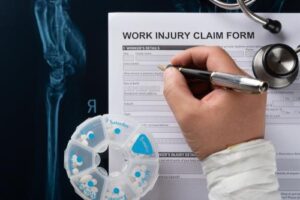
Although many people assume workers’ compensation benefits are only for labor workers, the truth is that nearly anyone may be eligible for workers’ comp if they suffer a work-related injury. The teachers across the state of Georgia work in some of the largest school districts in the nation. For example, Gwinnett County alone has nearly 180,000 students.
Unfortunately, while many teachers might assume their professions are safe, there are several instances in which teachers like you may experience work-related injuries or illnesses. With help from a knowledgeable Georgia workers’ compensation lawyer from John Foy & Associates, you can access Georgia workers’ compensation for teachers. Contact our law office today to find out whether you meet the eligibility requirements and how to handle a denied workers’ comp claim.
Teachers Often Suffer On-the-Job Injuries
Any profession has the potential for injuries, even when participating in activities that are within the scope of your job responsibilities. While teachers may not be working at elevated heights or with dangerous or heavy machinery, they are still susceptible to injuries and illness. Some of the most common ways in which teachers suffer work-related injuries include:
School Violence
Violence in school settings is a serious cause for concern. Not only are our teachers at risk of being injured when trying to prevent students from engaging in horseplay or fighting but there is also a very real concern regarding school shootings. According to U.S. News & World Report, there were 35 injuries and deaths caused by school shootings between 2018 and 2023.
Although the Occupational Safety and Health Administration (OSHA) requires schools to take necessary precautions to keep both students and teachers out of harm’s way, many agree that there are not enough safety precautions in place to reduce the number of violent incidents in schools. Teachers who suffered traumatic brain injuries, gunshot wounds, puncture wounds, broken bones, and other serious injuries may be entitled to workers’ compensation benefits. The school system should have workers’ comp in place to protect you and offer some financial support.
Exposure to Toxic Chemicals
Teachers who work in older school buildings may be exposed to toxic chemicals and substances. For example, schools that were built prior to the 1980s may be contaminated with asbestos. People who are exposed to asbestos over a long period of time may develop a serious type of cancer known as mesothelioma, according to the National Cancer Institute.
However, teachers may also be exposed to mold in school buildings. If the school system fails to properly maintain the school, teachers and students alike may be exposed to the toxins that mold carries. You may experience memory loss, headaches, blurred vision, or other symptoms associated with toxic mold exposure.
Slips and Falls
Slip and fall accidents can occur in even seemingly innocent situations. For example, if you were walking your students to the cafeteria and slipped on some spilled milk, you could suffer a broken leg or hip. Schools with insufficient funding may find the premises more dangerous due to damaged flooring, torn carpeting, and other hazardous conditions.
Repetitive Stress Injuries
Teachers also frequently perform repetitive tasks. Teachers may spend long periods of time standing, working at a computer, or picking up heavy books. You may experience a leg, hip, or back injury, muscle strains or sprains, or even carpal tunnel syndrome affecting your hands and wrists.
Get the strong arm
Georgia Teachers May Be Entitled to Workers’ Compensation
According to the Georgia State Board of Workers’ Compensation (SBWC), all Georgia employers with three or more employees are required to protect their staff with workers’ compensation coverage. School employees may be on the state’s payroll and are therefore protected by Georgia’s self-insured workers’ compensation benefits. According to the SBWC, you are required to inform school administrators about your work-related injury within 30 days of the incident.
Administrators will complete Form WC-1 Section A and submit this form to the insurance company. This document will then be sent to the Georgia SBWC. If you are out of work for more than seven calendar days, suffer a compensable catastrophic injury, or suffer lost wages as a result of your on-the-job injury, you may have the right to workers’ comp benefits.
If a third party is involved or the insurance company believes a claim is suspicious, the Department of Administrative Services (DOAS) Risk Management Team will conduct a comprehensive investigation. Private investigators may be assigned to gather evidence if the claim is suspected to be fraudulent. Working with an experienced Atlanta personal injury attorney may be the best way to protect yourself from false accusations.
Which Workers’ Compensation Benefits Teachers Can Collect
You have the right to specific types of benefits once your workers’ compensation claim has been approved. Generally, you should be able to continue receiving benefits until you can return to work. Examples of such benefits include:
- Vocational Rehabilitation – If your injuries are so severe you cannot continue teaching, you may be entitled to compensation for on-the-job training or vocational rehabilitation so you can find employment in a new line of work.
- Medical Benefits – The insurance company will cover every single medical expense related to your teaching injuries.
- Disability Benefits – You should collect approximately 66 ⅔% of your average weekly salary in the form of disability benefits.
- Death Benefits – If you are a teacher who suffers a fatal injury at work or succumbs to catastrophic injury, your surviving family members may be entitled to death benefits, which include disability benefits and coverage of your funeral and burial expenses.
We Help Injured Teachers Get the Financial Support They Deserve. Call in the Strong Arm
We can all agree that teachers are overworked and underpaid. When you suffer a work-related injury as a teacher, the least the school system can do is provide you with the financial support you need to recuperate. Accessing Georgia workers’ compensation benefits for teachers should not be as difficult as it is.
Do not be surprised if the insurance company denies your claim. Turn to a highly skilled workers’ compensation attorney from John Foy & Associates to show the insurance company you are taking your case seriously. We can start working on your appeal as soon as today when you call our office or complete our quick contact form to schedule a free, no-obligation consultation.
404-400-4000 or complete a Free Case Evaluation form





